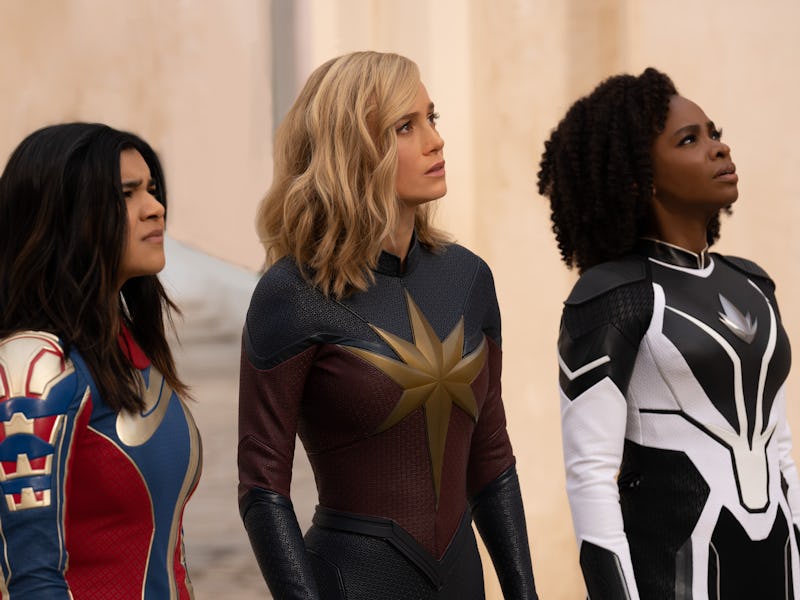The Marvels Doubles Down on the MCU’s Most Concerning Bad Habit
Marvel’s post-Endgame track record remains spotty.

Contrary to what many critics and fans may have thought in the weeks leading up to its release, The Marvels is far from a total disaster. Its first act is, in fact, a complete blast — a cross-cutting, action-packed blast of infectious, zany energy that brings the film’s three leads together while simultaneously — and hilariously — keeping them apart. The further into its runtime The Marvels gets, though, the more it falls apart.
The film’s climax is, in true Marvel Cinematic Universe fashion, disjointed and disappointing. More importantly, the movie fails to pull off its story about Carol Danvers (Brie Larson), Kamala Khan (Iman Vellani), and Monica Rambeau (Teyonah Parris) and their scientifically linked powers. That’s largely because the MCU’s previous films and TV shows haven’t developed Larson’s Carol or Parris’ Monica nearly enough to suddenly thrust them into the center of a team-up plot.
To be clear: There’s something undeniably fun about the way that The Marvels brings Carol Danvers together with her two biggest supporters. The problem is that not enough actual work was done prior to The Marvels to make its story anything more than a cool idea. And that’s becoming an increasingly common problem within the MCU.
Kamala Khan and Carol Danvers’ relationship is just as charming as you’d expect, but it’s weighed down by all of The Marvels’ forced emotional confrontations and exposition dumps.
The Marvels follows its three leads as their relationships and perceptions of each other are challenged. Kamala is forced to see her childhood hero as more than just a one-dimensional symbol of girl power. Carol, conversely, is forced to acknowledge her failings as a mentor, aunt, and galactic hero, while Monica is made to look past the grudge she’s long held against her mother’s best friend. On paper, their arcs all make sense, but The Marvels relies on ham-fisted exposition dumps and shoehorned-in flashbacks to make up for the gaps in Carol and Monica’s stories.
The film skips over so much of specifically Carol’s life that both her relationship with Monica and her decades-spanning role in the Kree-Skrull conflict are robbed of the dramatic weight they demand. Like Secret Invasion earlier this year, the movie fast travels through the 30 years since Captain Marvel just to indulge in a plot that requires more knowledge of Carol’s life throughout that period to be at all impactful. Ultimately, it’s hard to watch both Secret Invasion and The Marvels and not feel like you missed out on the Captain Marvel sequel that should have been made before them.
The Marvels isn’t the first MCU film that evokes such a feeling, either. Whether it be Wanda Maximoff’s drastic heel turn in Doctor Strange in the Multiverse of Madness or the entirety of Secret Invasion, Marvel’s post-Avengers: Endgame release slate has been littered with movies and TV shows built on little more than fun, underbaked ideas. The Marvels, for its part, frequently suffers from its own lack of set-up. Its second and third acts hit multiple emotional beats for both Carol and Monica, but they all fall flat because of how underdeveloped their relationship has always been.
Brie Larson should have been given another solo outing as Carol Danvers before The Marvels.
The Marvels commits arguably its biggest mistake in its post-credits scene, which catches up with Monica in the alternate universe that viewers watched her willingly trap herself in minutes earlier. Waking up in a hospital bed, Monica’s shocked to see her mother, Maria Rambeau (Lashana Lynch), sitting next to her. She quickly learns, however, that she hasn’t actually been reunited with Maria, but a superhero variant of her known as Binary. Her confusion is only amplified when Beast (Kelsey Grammer) walks in moments later — revealing that Monica has ended up in the care of an alternate-reality version of the X-Men.
The scene should be a celebratory moment for fans, but it’s more confusing than anything else. Is this really how Marvel has chosen to set up the X-Men in the MCU? By introducing a CGI version of Beast and a variant of Monica’s mom who live in a completely different universe? It’s a jarring and lackluster reveal that feels like it was thrown together simply so that Marvel could give comic book fans an X-Men Easter egg that would make them cheer in the theater. In that way, it feels reminiscent of the final post-credits scene of Eternals, which not only inserts Mahershala Ali’s Blade into a film that has absolutely nothing to do with him but also sets up a future for him and Kit Harington’s Dane Whitman that seemed unclear at the time and only moreso now.
Teaming up Dane and Blade is an interesting concept, as is stranding a hero like Monica Rambeau in a universe overseen by the X-Men, but they’re little more than that. Unfortunately, it’s beginning to feel more and more like the MCU is being held together not by compelling, well-thought-out stories, but by a bunch of disparate, surface-level ideas. The Marvels only further cements that problem.
The Marvels is now playing in theaters nationwide.